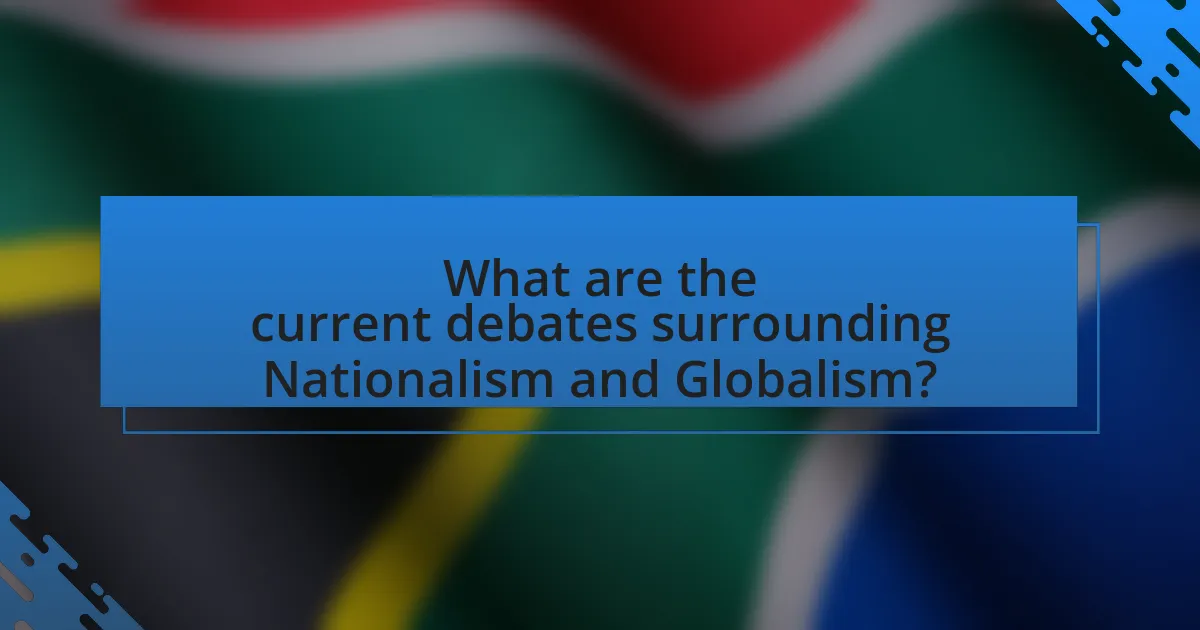Nationalism and globalism represent two contrasting political ideologies that shape contemporary society. Nationalism prioritizes the interests and identity of individual nations, often emphasizing sovereignty and cultural heritage, while globalism advocates for interconnectedness and cooperation among nations to address global challenges. This article explores the historical roots, key characteristics, and implications of both ideologies, examining how nationalism influences national identity and political movements, and how globalism impacts economic interdependence and cultural exchange. Additionally, it addresses current debates surrounding the resurgence of nationalism and the criticisms directed at globalism, highlighting the complex interplay between these two ideologies in today’s world.

What is Nationalism and Globalism?
Nationalism is a political ideology that emphasizes the interests and culture of a particular nation, often prioritizing national sovereignty and identity over international cooperation. Globalism, in contrast, advocates for the interconnectedness of nations, promoting economic, political, and cultural collaboration across borders. The rise of nationalism can be seen in movements that seek to protect local jobs and traditions, while globalism is supported by entities like the United Nations and trade agreements that aim to foster global economic growth and cultural exchange. Historical examples include the post-World War II establishment of international institutions to promote global cooperation, contrasting with the recent resurgence of nationalist sentiments in various countries, which often challenge these global frameworks.
How do Nationalism and Globalism differ in their core principles?
Nationalism and globalism differ fundamentally in their core principles, with nationalism emphasizing the primacy of the nation-state and its interests, while globalism advocates for interconnectedness and cooperation among nations. Nationalism prioritizes sovereignty, cultural identity, and the welfare of its citizens, often leading to policies that favor domestic industries and restrict immigration. In contrast, globalism promotes free trade, open borders, and the idea that global challenges, such as climate change and economic inequality, require collective action across nations. Historical examples include the rise of nationalist movements in the 19th and 20th centuries, which sought to assert national identity, versus the establishment of international organizations like the United Nations and the World Trade Organization, which embody globalist principles aimed at fostering collaboration and reducing barriers between countries.
What are the historical roots of Nationalism?
The historical roots of nationalism can be traced back to the late 18th century, particularly during the American and French Revolutions, which emphasized the concepts of self-determination and popular sovereignty. These revolutions inspired a sense of national identity and unity among people who shared common language, culture, and history. The Treaty of Westphalia in 1648 also laid the groundwork for the modern nation-state system, establishing the principle of territorial sovereignty that further fueled nationalist sentiments. Additionally, the rise of Romanticism in the 19th century celebrated national heritage and folklore, reinforcing the idea of a collective national identity. These events collectively contributed to the emergence and evolution of nationalism as a powerful political ideology.
What are the historical roots of Globalism?
The historical roots of Globalism can be traced back to the Age of Exploration in the 15th and 16th centuries, when European powers expanded their trade networks and colonial empires across the globe. This period marked the beginning of increased interconnectedness among nations, driven by economic interests and the exchange of goods, ideas, and cultures. The establishment of international trade routes and the subsequent rise of capitalism further solidified these global connections. Additionally, the aftermath of World War II and the formation of international organizations, such as the United Nations and the World Trade Organization, reinforced the principles of cooperation and interdependence among nations, laying the groundwork for modern Globalism.
What are the key characteristics of Nationalism?
The key characteristics of nationalism include a strong sense of identity, the prioritization of national interests, and the belief in self-determination. Nationalism fosters a collective identity among people based on shared culture, language, and history, which can lead to a unifying national consciousness. It emphasizes the importance of sovereignty and often advocates for the political independence of a nation-state, as seen in movements for independence throughout history, such as the American Revolution and the decolonization of Africa in the mid-20th century. Additionally, nationalism can manifest in policies that prioritize domestic over foreign interests, reflecting a desire to protect national resources and promote economic self-sufficiency.
How does Nationalism manifest in political movements?
Nationalism manifests in political movements through the promotion of national identity, sovereignty, and self-determination. Political movements often leverage nationalism to unify citizens around a common cultural, historical, or linguistic heritage, which can lead to increased support for policies that prioritize national interests over global cooperation. For example, the rise of nationalist parties in Europe, such as the National Front in France and the Alternative for Germany, illustrates how these movements capitalize on public sentiment regarding immigration and economic protectionism, advocating for policies that favor native citizens. Additionally, historical instances like the independence movements in India and various African nations demonstrate how nationalism can drive the quest for autonomy from colonial powers, emphasizing the importance of self-governance and cultural revival.
What role does culture play in Nationalism?
Culture plays a fundamental role in nationalism by shaping collective identity and fostering a sense of belonging among individuals within a nation. Nationalism often draws upon shared cultural elements such as language, traditions, history, and values to unify people and distinguish them from others. For instance, the promotion of a national language can enhance communication and solidarity, while cultural symbols, like flags and anthems, evoke emotional connections to the nation. Historical events, such as the French Revolution, illustrate how cultural narratives can mobilize populations around national identity, reinforcing the idea that a shared culture is essential for national cohesion and .
What are the key characteristics of Globalism?
Globalism is characterized by the interconnectedness of economies, cultures, and political systems across the globe. This ideology promotes free trade, open borders, and the movement of people and ideas, fostering international cooperation. Key characteristics include economic interdependence, where nations rely on each other for goods and services; cultural exchange, which enhances global understanding and diversity; and the advocacy for multinational institutions, such as the United Nations and World Trade Organization, that facilitate global governance. These elements underscore the belief that global challenges, such as climate change and terrorism, require collective action beyond national borders.
How does Globalism influence international relations?
Globalism influences international relations by promoting interconnectedness among nations, leading to increased cooperation on global issues such as trade, climate change, and security. This interconnectedness is evidenced by the establishment of international organizations like the United Nations and trade agreements such as the North American Free Trade Agreement (NAFTA), which facilitate collaboration and dialogue among countries. Furthermore, globalism encourages the flow of information, culture, and capital across borders, which can enhance diplomatic relations and foster mutual understanding. For instance, the rise of multinational corporations has created economic ties that often transcend national boundaries, making countries more interdependent and influencing their foreign policies.
What economic factors drive Globalism?
Economic factors driving Globalism include trade liberalization, technological advancements, and capital mobility. Trade liberalization reduces tariffs and barriers, facilitating international commerce; for instance, the establishment of the World Trade Organization in 1995 significantly increased global trade volumes. Technological advancements, particularly in communication and transportation, enable businesses to operate across borders efficiently, exemplified by the rise of e-commerce platforms like Amazon, which connect consumers and producers worldwide. Capital mobility allows for the free flow of investments across nations, as seen in the surge of foreign direct investment, which reached approximately $1.5 trillion in 2020, promoting economic interdependence among countries. These factors collectively enhance economic integration and foster a global marketplace.

What are the implications of Nationalism and Globalism on society?
Nationalism and globalism significantly shape societal structures and interactions. Nationalism often fosters a sense of identity and unity within a nation, leading to increased social cohesion and patriotism; however, it can also result in exclusionary practices and xenophobia, as seen in various countries where nationalist movements have gained traction. Conversely, globalism promotes interconnectedness and cooperation across borders, enhancing economic opportunities and cultural exchange, but it can also lead to the erosion of local cultures and economic disparities, as evidenced by the backlash against globalization in regions experiencing job losses due to outsourcing. The interplay between these ideologies influences political discourse, social dynamics, and economic policies, ultimately affecting how societies navigate challenges in an increasingly interconnected world.
How does Nationalism affect national identity?
Nationalism significantly shapes national identity by fostering a sense of belonging and unity among individuals within a nation. This ideology emphasizes shared culture, language, and history, which collectively contribute to a distinct national identity. For instance, the rise of nationalism in the 19th century led to the unification of Italy and Germany, where common cultural elements were highlighted to create a cohesive national identity. Additionally, nationalism can lead to the exclusion of those who do not share the dominant cultural traits, thereby reinforcing a specific national identity while marginalizing others. Historical examples, such as the impact of nationalism during the World Wars, illustrate how national identity can be mobilized for collective action and political agendas.
What are the positive aspects of Nationalism for a country?
Nationalism can foster a strong sense of identity and unity among citizens, which can enhance social cohesion and national . This collective identity often leads to increased civic engagement and participation in democratic processes, as individuals feel a deeper connection to their nation. For example, during the 19th century, nationalist movements in Europe, such as the unification of Germany and Italy, demonstrated how nationalism can mobilize populations towards common goals, resulting in political stability and economic growth. Additionally, nationalism can promote the protection of local industries and cultural heritage, as seen in policies that prioritize domestic production and safeguard traditional practices. These aspects contribute to a nation’s resilience and ability to navigate global challenges while maintaining its unique character.
What are the negative consequences of extreme Nationalism?
Extreme nationalism can lead to significant negative consequences, including social division, conflict, and the erosion of democratic values. Social division occurs as extreme nationalism fosters an “us versus them” mentality, often marginalizing minority groups and creating societal rifts. Historical examples, such as the rise of fascism in Europe during the early 20th century, illustrate how extreme nationalist ideologies can culminate in violent conflict, including wars and genocides. Additionally, extreme nationalism can undermine democratic values by promoting authoritarian governance, as seen in various countries where nationalist leaders suppress dissent and curtail civil liberties to maintain control. These consequences highlight the dangers of prioritizing national identity over global cooperation and human rights.
How does Globalism impact cultural exchange?
Globalism enhances cultural exchange by facilitating the flow of ideas, traditions, and practices across borders. This interconnectedness allows for greater exposure to diverse cultures, leading to increased understanding and appreciation among different populations. For instance, global communication technologies and international travel have made it easier for individuals to share their cultural heritage, resulting in hybrid cultural forms and the globalization of cultural products, such as music and cuisine. According to a report by the World Economic Forum, cultural exchange through globalism can foster innovation and creativity, as diverse perspectives contribute to new ideas and solutions.
What are the benefits of Globalism for cultural diversity?
Globalism enhances cultural diversity by facilitating the exchange of ideas, traditions, and practices across borders. This interconnectedness allows for a richer tapestry of cultural experiences, as individuals are exposed to various worldviews and lifestyles. For instance, global communication platforms enable the sharing of art, music, and literature from different cultures, fostering appreciation and understanding. Additionally, globalism promotes multiculturalism, as seen in cities like Toronto and London, where diverse populations coexist and contribute to a vibrant cultural landscape. Studies indicate that societies embracing globalism tend to exhibit greater tolerance and acceptance of cultural differences, further enriching their social fabric.
What challenges does Globalism pose to local cultures?
Globalism poses significant challenges to local cultures by promoting homogenization and diminishing cultural diversity. As global interconnectedness increases, local customs, languages, and traditions often face erosion due to the dominance of global brands and media, which can overshadow indigenous practices. For instance, the spread of Western consumer culture has led to the decline of traditional lifestyles in various regions, as seen in the rapid urbanization and cultural shifts in countries like India and China. This phenomenon is supported by research indicating that globalization can lead to cultural imperialism, where local identities are subsumed under a global narrative, resulting in a loss of cultural heritage and community cohesion.

What are the current debates surrounding Nationalism and Globalism?
Current debates surrounding nationalism and globalism focus on the tension between national sovereignty and international cooperation. Proponents of nationalism argue that prioritizing national interests leads to stronger governance and cultural preservation, as seen in movements like Brexit, where the UK sought to regain control over its laws and borders. Conversely, advocates of globalism emphasize the need for collaborative solutions to global challenges such as climate change and economic inequality, highlighting the effectiveness of international agreements like the Paris Accord. These debates are further fueled by rising populism, economic disparities, and the impact of globalization on local economies, leading to a complex discourse on identity, security, and economic policy.
Why is there a resurgence of Nationalism in recent years?
The resurgence of nationalism in recent years is primarily driven by economic discontent and a reaction against globalization. Many individuals feel left behind by global economic policies that have led to job losses and wage stagnation, prompting a desire to prioritize national interests over international cooperation. For instance, the rise of populist leaders in various countries, such as Donald Trump in the United States and Jair Bolsonaro in Brazil, reflects a growing sentiment that emphasizes national sovereignty and identity. Additionally, events like the Brexit referendum in the United Kingdom illustrate how concerns over immigration and cultural identity have fueled nationalist movements. These trends indicate a significant shift towards valuing national over global affiliations, as evidenced by increasing support for policies that restrict immigration and promote domestic industries.
What economic factors contribute to the rise of Nationalism?
Economic factors that contribute to the rise of nationalism include economic inequality, unemployment, and the impact of globalization on local economies. Economic inequality fosters resentment among citizens who feel marginalized, leading them to seek nationalistic solutions that prioritize their interests. High unemployment rates can create a sense of insecurity, prompting individuals to rally around nationalist sentiments as a means of protecting jobs and industries. Additionally, globalization often results in the outsourcing of jobs and the decline of local industries, which can provoke a backlash against perceived foreign influence and encourage a resurgence of national identity. Historical examples include the rise of nationalist movements in response to economic crises, such as the Great Depression in the 1930s, which saw increased support for nationalist parties in various countries as people sought stability and protectionism.
How do political leaders leverage Nationalism for their agendas?
Political leaders leverage nationalism to unify their constituents and promote their agendas by invoking a shared identity and common values among the populace. This strategy often involves emphasizing national , cultural heritage, and historical narratives that resonate with citizens, thereby fostering a sense of belonging and loyalty. For instance, leaders may use rhetoric that highlights perceived threats from foreign entities or global influences, positioning themselves as protectors of national interests. Historical examples include leaders like Donald Trump, who utilized nationalist themes during his 2016 campaign to galvanize support by appealing to American exceptionalism and economic protectionism. Such tactics can effectively mobilize voters and consolidate power, as evidenced by the rise of nationalist movements in various countries, which often capitalize on economic discontent and social anxieties.
What criticisms are directed at Globalism today?
Criticisms directed at Globalism today include concerns about economic inequality, loss of national sovereignty, and cultural homogenization. Critics argue that Globalism disproportionately benefits multinational corporations and wealthy nations while exacerbating income disparities within and between countries. For instance, a report by the International Labour Organization in 2021 highlighted that globalization has led to a widening gap in wages and job security, particularly affecting low-skilled workers. Additionally, opponents claim that Globalism undermines national sovereignty by prioritizing international agreements over local laws, which can dilute a nation’s ability to govern itself effectively. Furthermore, cultural homogenization is criticized for eroding local traditions and identities, as seen in the spread of Western consumer culture, which some argue threatens cultural diversity globally.
How does Globalism affect income inequality?
Globalism tends to exacerbate income inequality by creating economic disparities between skilled and unskilled workers. As global markets expand, high-skilled workers in developed countries often benefit from increased demand for their expertise, leading to higher wages. Conversely, low-skilled workers face competition from cheaper labor markets in developing countries, which can suppress their wages and job security. According to a report by the International Labour Organization, the global labor market dynamics have contributed to a widening income gap, with the richest 10% of the population capturing a significant share of global income growth, while the poorest remain stagnant. This trend illustrates how globalism can lead to unequal economic outcomes, reinforcing existing inequalities within and between nations.
What are the environmental concerns associated with Globalism?
Globalism raises several environmental concerns, primarily due to increased resource consumption and pollution associated with global trade. The expansion of international trade networks often leads to higher carbon emissions from transportation, as goods are shipped across long distances. For instance, a study by the Global Carbon Project indicates that international shipping contributes approximately 3% of global greenhouse gas emissions. Additionally, globalism can result in the exploitation of natural resources in developing countries, leading to deforestation, habitat destruction, and biodiversity loss. The World Wildlife Fund reports that global trade has been a significant driver of biodiversity decline, with species extinction rates accelerating due to habitat degradation linked to resource extraction for global markets. These factors illustrate the complex environmental challenges posed by globalism.
What can individuals do to navigate the clash between Nationalism and Globalism?
Individuals can navigate the clash between Nationalism and Globalism by actively engaging in informed discussions and promoting understanding between diverse perspectives. By educating themselves on both ideologies, individuals can identify common ground and foster dialogue that respects national identities while recognizing global interdependence. Research indicates that societies with higher levels of civic engagement and education tend to exhibit greater tolerance and cooperation, as seen in countries like Canada and Sweden, where multicultural policies have successfully integrated diverse populations.





